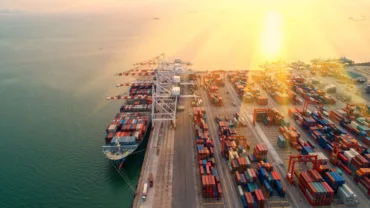Jump to ↓
| Prioritizing KYV |
| The importance of accountability |
| Benefits of KYV |
| Implementing KYV |
| Improving KYV processes |
Manufacturers depend upon reliable, consistent supply chains to assemble their products and bring goods to market. But the supply “chain” isn’t just a list of suppliers, it’s a dynamic, interconnected web of vendors and other intermediaries engaged in a complex production and distribution process that often spans the globe.
Supply chains are surprisingly fragile, though, even for large manufacturers. One weak link can grind the manufacturing process to a halt. Disreputable, unethical, or illegitimate vendors can even threaten a brand’s reputation and/or subject a company to legal risks and financial penalties.
Prioritizing KYV
Because the risks are so great, companies must do everything they can to protect the integrity of their supply chains.
Unfortunately, vendor verification can be a daunting process for large manufacturers. To avoid vendor-related supply-chain disruptions and compliance issues, companies need to prioritize Know Your Vendor (KYV) protocols, a form of due-diligence best practices that ensure vendor compliance all along the supply chain and hold non-compliant vendors accountable for any illegitimate or illegal business practices that could put the larger company at risk.
The importance of accountability
Accountability is the cornerstone of supply-chain integrity. Vendors must understand that they don’t just provide components and materials to their corporate customers, they are in fact extensions of the companies they serve. As such, a vendor’s behavior and business practices—laudable or not—reflect the values of the companies they supply. And in today’s marketplace, a company’s mission and values are under more scrutiny than ever—by investors, customers, and regulators alike.
It is of course inadvisable to use a vendor that is in perpetual legal trouble or has a track record of non-compliance or financial instability. But investors also want to know if a company is operating ethically and meeting its Environmental, Social, and Governance (ESG) goals. Customers want to know how a company is sourcing its materials and whether it is using suppliers that engage in unfair or illegal labor practices. Regulators want to know all of this and more to ensure that a company’s manufacturing practices are legally compliant with industry standards.
Benefits of KYV
Companies are ultimately responsible for the behavior of their suppliers. But the only way for a manufacturer to know for certain that their suppliers are reliable, ethical, and compliant business partners is to implement a comprehensive, ongoing KYV program, one that provides a fully transparent understanding of every vendor link in the supply chain. Such a program also enables companies to proactively identify and address potential risks, and helps build long-term vendor relationships based on trust, accountability, and a shared sense of values.
Other benefits of a state-of-the-art KYV program include:
- Enhanced supply-chain visibility: Not only do KYV practices provide detailed insight into vendor business practices, KYV also help ensure ethical, sustainable, efficient operations all along the supply chain, including Tier 2 and Tier 3 suppliers.
- Regulatory compliance: KYV practices help verify that vendors are adhering to relevant regulations, certifications, jurisdictional rules, and accepted industry standards, thereby streamlining the compliance process and saving money.
- Brand protection: KYV protocols help manufacturers anticipate and identify potential risks, dramatically reducing the possibility of brand-damaging blowback in the news or on social media.
- Superior efficiency: Using state-of-the-art verification software—such as programs in Thomson Reuters Risk & Fraud Solutions—manufacturers can confirm business identities 40% faster than a standard Google search and execute other searches—for risk assessments, adverse media events, compliance requirements, sanctions—from 20-40% faster, with significantly greater accuracy and depth.
- Greater accountability: KYV practices help build and maintain the essential bond of trust between a company’s customers, investors, and vendors, all of whom expect the company to act responsibly and ethically.
Implementing KYV
Even if a company decides to make KYV accountability a higher priority, however, it must also invest in the personnel, resources, and training necessary to develop an effective KYV program.
Time is also an important factor to consider. For example, many large manufacturers—particularly those involved in industrial manufacturing, fabrication, production, and distribution—have hundreds of suppliers and often encounter difficulties obtaining reliable information on vendors located around the world. In such cases, trying to track down vendor information on publicly available search engines is all but impossible. The process is too time-consuming, and the information obtained is likely to be incomplete and potentially misleading.
Improving KYV processes
To address these issues, one of the most important resources needed for an effective KYV process is some type of fraud-and-risk-detection software — such as Thomson Reuters Adverse Media and Sanctions, ID Confirm, and Risk Inform — that can quickly perform identity verification, due diligence, risk screening and assessments on vendors. Ideally, such a program would also provide access to global business registries and records to verify non-U.S. businesses and their ownership.
Any state-of-the-art KYV system should also issue automatic alerts and, after a vendor is onboarded, enable continuous monitoring of vendor performance. In addition, the system should enable the KYV team to conduct regular audits and assessments to identify emerging risks and take corrective actions.
In manufacturing, accountability up and down the supply chain is the key to sustainable prosperity and long-term success. By prioritizing KYV, companies can strengthen their operations, protect their brand, and thrive in an increasingly competitive global marketplace.
To learn more about how Thomson Reuters Risk & Fraud Solutions can help manufacturing companies prioritize accountability and improve KYV processes, explore our solutions. Thomson Reuters provides intuitive, comprehensive platforms that allow companies to streamline their due-diligence processes, enhance supply-chain transparency, and ensure compliance throughout the supply chain.
Find out more about Thomson Reuters Risk & Fraud Solutions.
Thomson Reuters is not a consumer reporting agency and none of its services or the data contained therein constitute a ‘consumer report’ as such term is defined in the Federal Fair Credit Reporting Act (FCRA), 15 U.S.C. sec. 1681 et seq. The data provided to you may not be used as a factor in consumer debt collection decisioning, establishing a consumer’s eligibility for credit, insurance, employment, government benefits, or housing, or for any other purpose authorized under the FCRA. By accessing one of our services, you agree not to use the service or data for any purpose authorized under the FCRA or in relation to taking an adverse action relating to a consumer application.







